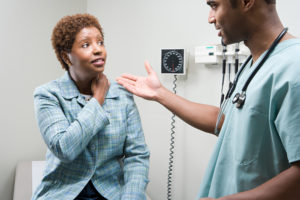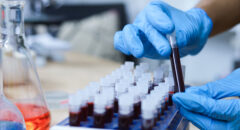
Fewer cycles of chemotherapy and lower dosage radiation may work just as well as more grueling treatment for early-stage Hodgkin lymphoma. Each type of treatment for Hodgkin lymphoma has side effects that could last for months or longer, or that might not show up until long after treatment has ended. Some side effects, like loss of fertility, may be permanent. However, a new practice links those side effects occurring less often in those who had less intensive treatment compared to the more intensive treatment.
Researchers in Germany randomly assigned 1,370 patients with early-stage Hodgkin's lymphoma into four groups: four cycles of chemotherapy followed by either 30 Gy of radiation or 20 Gy of radiation; or two cycles of chemo followed by 30 Gy of radiation or 20 Gy of radiation.
Gy is the abbreviation for gray, a unit of measurement for radiation. The chemotherapy was a four-drug combination – doxorubicin, bleomycin, vinblastine, and dacarbazine (ABVD) – the standard treatment for the disease.
After five years, 91.1 percent of patients in the weakest treatment group (two cycles of chemo and the lesser dosage of radiation) had not experienced a relapse, while 93 percent of those in the strongest treatment group (four cycles of chemo and the higher dosage of radiation) had the researchers found.
Though there was a slight difference, the numberswere not statistically significant, leading researchers to conclude that the less grueling treatment is just as effective.
"The result is very straightforward: there is more toxicity with the more intensive treatment, and there is less toxicity with the less intensive treatment," said study author Dr. Andreas Engert, a professor of internal medicine, hematology and oncology at the University Hospital of Cologne. "Even the weakest combination of chemotherapy and radiotherapy was as good as the strongest treatment combination in terms of tumor control."
The study is published in the Aug. 12 issue of the New England Journal of Medicine. But Dr. Len Lichtenfeld, deputy chief medical officer for the American Cancer Society, said the findings aren't quite that straightforward. Although researchers found only a 1.6 percent difference between the strongest versus the weakest treatment regimen, the statistical analysis leaves open the possibility that the difference could have been as large as 6.3 percent.
That means patients should interpret the findings with caution, Lichtenfeld said, including discussing any changes they want to make to their treatment regimen with their oncologists first.
Because preliminary findings from this research have already been reported, many oncologists at major cancer centers may have already incorporated them into treatment recommendations, Lichtenfeld said.
"The authors note that there remains a possibility that there could have been a difference in the outcome of about 6 percent, meaning one in 16 patients may not have done well on the less intensive treatment," Lichtenfeld said. "I personally would not make a recommendation to a patient that they should use the least intensive treatment regimen based on these findings."
Hodgkin's lymphoma, which strikes about 8,500 people annually in the United States, originates in cells called lymphocytes, which are a part of the immune system, according to the American Cancer Society.Especially when caught early, it's highly treatable, Engert said. Among patients in the study, whose average age was 32, 95 percent were still alive after eight years, according to the research.
The problem is that the chemo and radiation used to treat the disease can cause both short and long-term side effects, Engert explained.
Short-term complications include hair loss and infections. Those side effects occurred less often in those who had the less intensive treatment compared to the more intensive treatment. For instance, about 28 percent of those who had four cycles of chemo lost their hair, compared to 15 percent of those who underwent two cycles.
Cancer treatment also has long-term complications. Radiation can damage the heart, raising the risk of coronary artery disease and other cancers in survivors’ decades after the Hodgkin's treatment, Lichtenfeld noted.
"One of the fallouts of our success treating Hodgkin's lymphoma is that a lot of people are alive now who have other serious medical conditions as a result of their treatment," Lichtenfeld said.
"As a result, investigators have been trying to find ways to further tailor therapy to reduce the treatments while maintaining the effectiveness."
Although the practice is early-on in their statistics, the alternative cancer treatment shows hope for patients apprehensive about the heavy side effects of chemotherapy and radiation.









